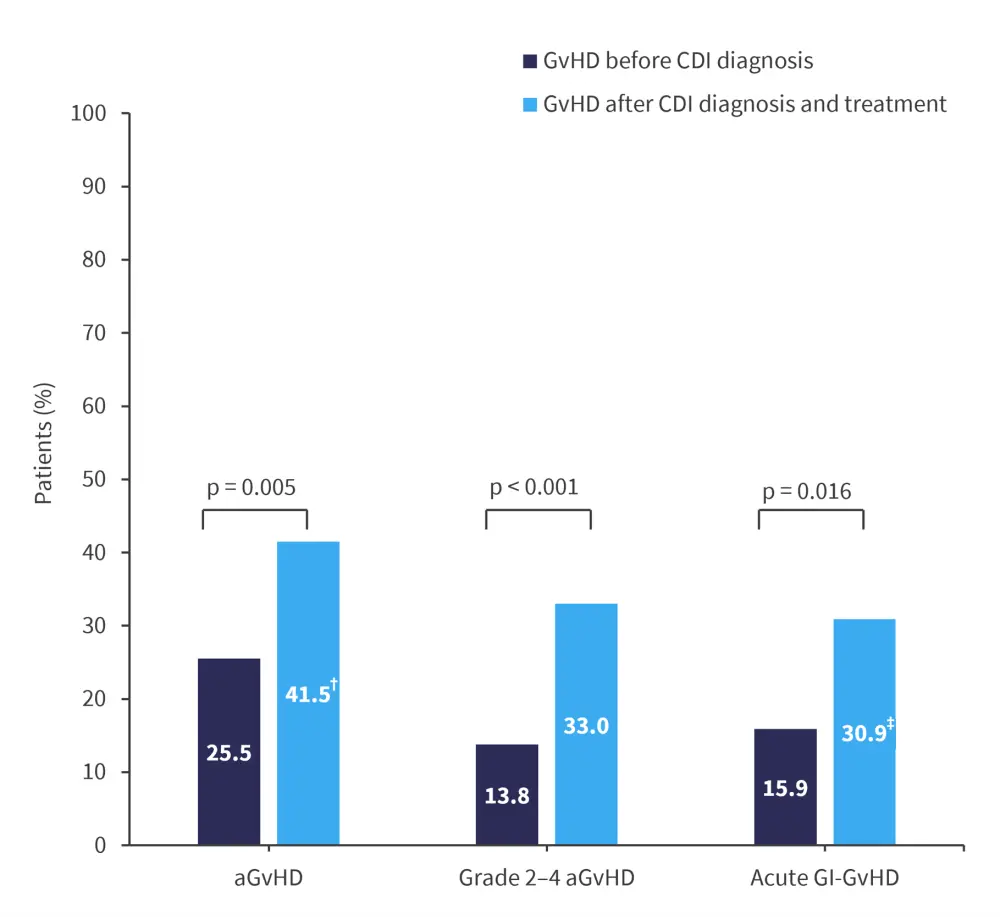All content on this site is intended for healthcare professionals only. By acknowledging this message and accessing the information on this website you are confirming that you are a Healthcare Professional.
The gvhd Hub website uses a third-party service provided by Google that dynamically translates web content. Translations are machine generated, so may not be an exact or complete translation, and the gvhd Hub cannot guarantee the accuracy of translated content. The gvhd and its employees will not be liable for any direct, indirect, or consequential damages (even if foreseeable) resulting from use of the Google Translate feature. For further support with Google Translate, visit Google Translate Help.
The GvHD Hub is an independent medical education platform, sponsored by Medac and supported through grants from Sanofi and Therakos. Funders are allowed no direct influence on our content. The levels of sponsorship listed are reflective of the amount of funding given. View funders.
Now you can support HCPs in making informed decisions for their patients
Your contribution helps us continuously deliver expertly curated content to HCPs worldwide. You will also have the opportunity to make a content suggestion for consideration and receive updates on the impact contributions are making to our content.
Find out more
Create an account and access these new features:
Bookmark content to read later
Select your specific areas of interest
View GvHD content recommended for you
Impact of Clostridioides difficile infection and its treatment on allo-HSCT outcomes
Patients undergoing allogeneic hematopoietic stem cell transplantation (allo-HSCT) are more susceptible to Clostridioides difficile infection (CDI). Antibiotics used to treat CDI can lead to the development or worsening of graft-versus-host disease (GvHD) or gastrointestinal-GvHD (GI-GvHD).1 The relationship between CDI and GvHD remains unclear as well as the impact of CDI and its treatment on allo-HSCT outcomes.1
Here, we summarize a multicenter, real-world study by Piekarska et al.1 published in Scientific Reports evaluating the impact of CDI and the type of CDI treatment on the occurrence of GvHD in patients undergoing allo-HSCT.
Study design1
- This was a multicenter study assessing retrospective and prospective data from patients attending Polish Adult Leukemia Group transplant centers.
- Eligible patients received allo-HSCT and had confirmed CDI.
- For first-line treatment of non-severe/severe CDI, patients in the prospective group received vancomycin.
- For severe/sudden onset of CDI, patients received combination therapy of vancomycin and metronidazole.
Key findings1
- In total, 109 patients were included in this study.
- CDI was diagnosed at a median of 11 days posttransplant.
- In total, 58.7% of patients developed CDI within 100 days posttransplant.
- Colonization with multidrug-resistant bacteria before CDI diagnosis occurred in 65.1% of patients.
- There was an increased incidence of aGvHD in patients after they developed CDI (Figure 1).
Figure 1. Occurrence of aGvHD pre- and post-CDI*

aGvHD, acute graft-versus-host disease; CDI, Clostridioides difficile infection; GI-GvHD, gastrointestinal-GvHD.
*Data from Piekarska, et al.1
†Chronic GvHD: 5.3%.
‡Chronic GI-GvHD: 2.1%.
- Treatment failure of CDI was higher with metronidazole compared with vancomycin (38.2% vs 6.2%, respectively; p < 0.001).
- Patients who received combination therapy had an increased rate of GvHD and GI-GvHD compared to those who received:
- metronidazole monotherapy: p = 0.01 and p = 0.007, respectively, or
- vancomycin monotherapy: p = 0.003 and p < 0.001, respectively.
- Patients treated with metronidazole monotherapy or as a part of a combination therapy showed a higher incidence of GI-GvHD vs those treated with vancomycin (p = 0.03).
- Second-line treatment of CDI was more frequently needed in the metronidazole group, which was also associated with an increased rate of GI-GvHD (p < 0.001).
- Changing to second-line treatment was associated with increased mortality due to GvHD at 6-month follow-up (p = 0.001).
- Increased mortality was also associated with the presence of GvHD before CDI (p < 0.005) or the development/worsening of GvHD after CDI (p < 0.05).
- In the multivariate analysis, the predictors of death included:
- the occurrence of aGvHD before CDI (hazard ratio [HR], 3.19; 95% confidence interval [Cl], 1.65–6.16; p = 0.009); and
- the need to change to second-line treatment of CDI (hazard ratio, 4.83; 95% CI, 2.46-9.47; p < 0.001).
|
Key learnings |
|---|
|
References
Please indicate your level of agreement with the following statements:
The content was clear and easy to understand
The content addressed the learning objectives
The content was relevant to my practice
I will change my clinical practice as a result of this content
Your opinion matters
Which consideration most strongly guides your decision to escalate therapy in SR-aGvHD?


